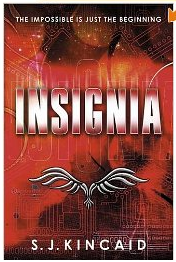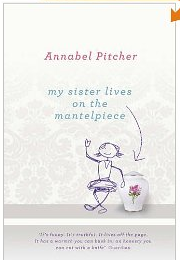 What to read after The Hunger Games, when Horowitz isn’t challenging enough? My son keeps telling me he hasn’t got anything to read.
What to read after The Hunger Games, when Horowitz isn’t challenging enough? My son keeps telling me he hasn’t got anything to read.
The books below are the best of the KS3 booklists, prizewinners and nominees, blurbs and Amazon reviews.
The Road of Bones, Anne Fine, re-issued 2007, one of the books chosen by Oxford University Press as a KS3 (age 11-14) class reader, i.e. books taught in English lessons at school because they’re ‘literary’.
 Blurb
BlurbTold who to cheer for, who to believe in, Yuri grows up in a country where no freedom of thought is encouraged.
Maggot Moon, by Sally Gardner: won the Costa Prize, 2012
Narrated against the backdrop of a ruthless regime determined to beat its enemies in the race to the moon. When his best friend Hector is suddenly taken away, Standish Treadwell realises that it is up to him, his grandfather and a small band of rebels to confront and defeat the ever-present oppressive forces of the Motherland.
Reviews
 ‘Dazzling, chilling, breathtaking. A perfect book.’ –Meg Rosoff
‘Dazzling, chilling, breathtaking. A perfect book.’ –Meg Rosoff‘Narrated by a boy with dyslexia, Standish Tredwell, it takes you inside the workings of his mind…as well as offering up something much darker: a parable about the perils of totalitarianism. …It also has a hopeful message – that a teenager, especially one with dyslexia, can have [power] in the world.’ –Lorna Bradbury, The Telegraph
Why did I buy it?
Wonder, R.J. Palacio, 2013 (a lot of adults enjoyed this one)
 Blurb
Blurb‘My name is August. I won’t describe what I look like. Whatever you’re thinking, it’s probably worse.’
Auggie wants to be an ordinary ten-year-old. He does ordinary things – eating ice cream, playing on his Xbox. He feels ordinary – inside. But ordinary kids don’t make other ordinary kids run away screaming in playgrounds. Ordinary kids aren’t stared at wherever they go.
Born with a terrible facial abnormality, Auggie has been home-schooled by his parents his whole life. Now, for the first time, he’s being sent to a real school – and he’s dreading it. All he wants is to be accepted – but can he convince his new classmates that he’s just like them, underneath it all?
Review
The Secret of Platform 13, Eva Ibbotson, re-issued 2009
Amazon Customer Review
 ‘At platform 13 of King’s Cross there’s the opening to a magical world of witches, hags, giants and creatures called mistmakers which puff out mist when they hear music, so keeping their island refuge secret.
‘At platform 13 of King’s Cross there’s the opening to a magical world of witches, hags, giants and creatures called mistmakers which puff out mist when they hear music, so keeping their island refuge secret.A gloriously funny quest with an ending that brings tears to the eyes. We particularly enjoyed the Mrs. Thatcher-style harpies who knock out enemies with their disgusting handbags.’
Why did I buy it?
Insignia (Insignia Trilogy), S.J. Kincaid 2012 – Waterstones Children’s Book Prize Teen List, also an Oxford University Press class reader
‘What if playing computer games could save the world… And the Government’s secret weapon was you? Tom Raines is suddenly recruited into the US Army to train as a virtual reality Combatant to see if he is good enough to help fight World War Three.
 Equipped with a new computer chip in his brain, it looks like Tom might actually become somebody. But what happens when you start to question the rules? In this first book in this fast-paced trilogy, Kincaid asks significant questions concerning the use of technology and the value of human life. Perfect for fans of Anthony Horowitz and Eoin Colfer.’
Equipped with a new computer chip in his brain, it looks like Tom might actually become somebody. But what happens when you start to question the rules? In this first book in this fast-paced trilogy, Kincaid asks significant questions concerning the use of technology and the value of human life. Perfect for fans of Anthony Horowitz and Eoin Colfer.’The Devil Walks, Anne Fine, 2012 – one of the KS3 Oxford University Press books
Raised in secrecy by a mother everyone thinks has gone mad, Daniel’s only link to his past is the intricately built model of the family home – High Gates. The dolls’ house is perfect in every detail.
 As Daniel is reunited with the last remaining member of his family – his ‘uncle’ Severin, who bears an uncanny resemblance to a sinister wooden doll he has found hidden in the house, he begins to suspect that this vicious, haunted puppet of a figure has a chilling influence, bringing cruelty and spite in its wake.
As Daniel is reunited with the last remaining member of his family – his ‘uncle’ Severin, who bears an uncanny resemblance to a sinister wooden doll he has found hidden in the house, he begins to suspect that this vicious, haunted puppet of a figure has a chilling influence, bringing cruelty and spite in its wake.Now Daniel’s very life is at risk as his uncle is determined to get his hands on the figure . . .
The menace builds throughout in this deliciously creepy Gothic tale.
Why did I buy it?
My Sister Lives on the Mantelpiece, Annabel Pitcher, 2011, on the 2012 Waterstones Teen Book Prize List (a lot of adults enjoyed this too)
Reviews
 You know how, every once in a while, you find a book that you know will become a class reader, found in every book cupboard, on every reading list? Well, My Sister Lives on the Mantelpiece is just one of those books. It is a stunning, special read. (NATE CLASSROOM )
You know how, every once in a while, you find a book that you know will become a class reader, found in every book cupboard, on every reading list? Well, My Sister Lives on the Mantelpiece is just one of those books. It is a stunning, special read. (NATE CLASSROOM )
Heartbreaking and funny in near equal measure the story of 10-year-old Jamie’s direct and wide-eyed telling of the emotional chaos he and his family live through following the death of his sister in a terrorist attack is poignant and warm hearted. Emotionally charged, this is a wonderful, touching story that never slips into worthiness. (THE OBSERVER )
Artemis Fowl, Eoin Colfer, re-issued 2011
Eoin Colfer, author of Artemis Fowl, describes his creation as “Die Hard with fairies”. He’s not far wrong. Artemis Fowl is the most ingenious criminal mastermind in history and with his trusty sidekicks, Butler and Juliet, in tow he hatches a cunning plot to divest the fairyfolk of their pot of gold. Of course, he isn’t foolish enough to believe in all that “gold at the end of the rainbow” nonsense.
 Rather, he knows that the only way to separate the little people from their stash is to kidnap one of their number and wait for the ransom to arrive. But when the time comes to put his plan into action he reckons without Captain Holly Short of the LEPrecon (Lower Elements Police Reconnaisance) Unit–a sort of extra small Clarice Starling with pointy ears and wings–and her senior officer Commander Root, a man (sorry, elf) who will stop at nothing to get her back.
Rather, he knows that the only way to separate the little people from their stash is to kidnap one of their number and wait for the ransom to arrive. But when the time comes to put his plan into action he reckons without Captain Holly Short of the LEPrecon (Lower Elements Police Reconnaisance) Unit–a sort of extra small Clarice Starling with pointy ears and wings–and her senior officer Commander Root, a man (sorry, elf) who will stop at nothing to get her back.
Fantastic stuff from beginning to end, Artemis Fowl is a rip-roaring, 21st-century romp of the highest order. The author has let his imagination run riot by combining folklore, fantasy and a fistful of high-tech funk in an outrageously devilish book that could well do for fairies what Harry Potter has done for wizardry. But be warned: this is no gentle frolic so don’t be fooled by the fairy subject matter. Instead what we have here is well written, sophisticated, rough and tumble storytelling with enough high-octane attitude to make it a seriously cool read for anyone over the age of 10.
Why did I buy it?
